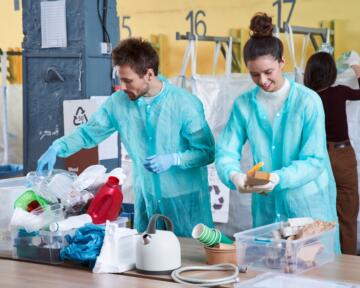The Flash Eurobarometer offers a clear insight into why companies find it difficult to work more sustainably. Belgian small and medium-sized enterprises report that the main obstacles are
- navigating the complex administration and legislation
- applying environmental legislation within their company
- working with legislation that is not technically up to date
SMEs face other, more practical difficulties, such as:
- the cost of sustainability efforts
- the lack of suitable materials, products or services
- insufficient internal expertise
However, because of their high economic value, SMEs play a crucial role in the green transition. This is evident from sustainability analyses by the FPS Economy.Only 30% of Belgian SMEs say they don’t face any barriers when undertaking sustainability action. Below are some useful tips to help lower the threshold.
1. Seek advice
You don’t have the knowledge or experience in-house to know exactly which rules you need to comply with? Don’t hesitate to bring in external experts:
- by hiring someone with the right qualifications
- by calling on a freelance expert, a specialist agency or public sector expertise for a limited period
Below is a non-exhaustive list of organisations that can provide expert advice:
The Walloon government also provides a list of experts who can offer tailored advice and guidance.
2. Forge partnerships
There’s no need to reinvent the wheel. Exchange ideas with businesses that are further along in their circular journey. Companies in the same sector can inspire each other in terms of materials and production processes, while businesses in entirely different sectors could be ideal partners in repurposingRepurposing designates all operations by which substances, materials or products that have become waste are used again. each other’s residual streams. There are many platforms, organisations and public services that can help you forge the right partnerships. Think of circular hubs such as:
3. Establish a financial plan
Implementing circular actions does not have to be costly. Calculate the costs of the adjustments, but don't forget the savings they will generate. A circular approach can also attract a new customer segment or give you access to a wide range of subsidies. To help you draw up a sound financial plan, here are some useful links:
- The Go for Circular website offers a handy overview of possible funding and support schemes in Belgium.
- FINMIX brings together a panel of financing experts who assess your plan and offer tips on how to improve it.
With these three tips and the help of these various actors, you have everything you need to make your circular transition a success.




